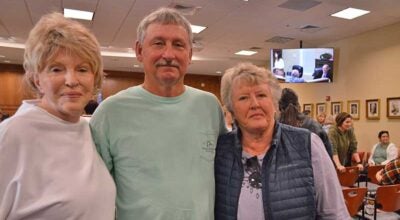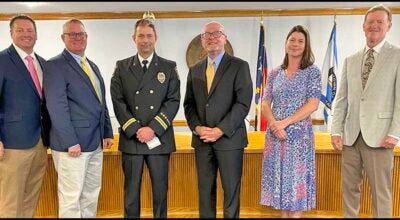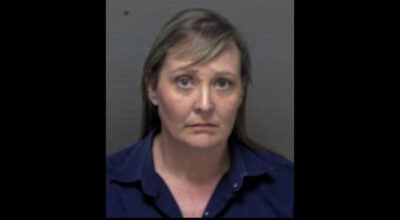North Carolina teen faces deportation over adoption problems
Published 6:00 am Tuesday, April 7, 2020
|
Getting your Trinity Audio player ready...
|
By NANCY MCLAUGHLIN, The Greensboro News & Record
She’s both a daddy’s girl and the “mini-me” to her mom.
Snapshots of them from a life full of smiles and laughter are spread over a nearby wall in the family’s small, tidy home in the shadow of N.C. A&T.
Prom. On a boat at the lake leaning on her mom. Playing in the grass.
And there, at 5 months, just after George W. Bush’s administration gave sanctuary to the Montagnard parents, then in a refugee camp in Cambodia after fleeing religious persecution in Vietnam.
“Maybe that’s one of my favorites,” Elizabeth Rahlan-Ksor said of the picture of her father with his arms protectively around her.
The Page High School senior is moved to brimming tears. Across the room, her father wipes away his own.
These tears are not for the fond memory, but for a current concern. A situation too hard to fathom.
“Hard to believe,” Elizabeth, an only child, said after taking a deep breath.
The teenager, who dreams of being a dentist, is in danger of being picked up by U.S. Immigration and Customs Enforcement.
Of being deported.
Despite the federal government having a part in bringing her here as a baby.
It is a tale that adds a new wrinkle to the debate of who has a right to be in America.
“I can’t imagine being in her shoes,” said Liana Adrong of the Montagnard Dega Association. “Where would she even go?”
‘STAY OUT OF TROUBLE’
Elizabeth sometimes finds herself sitting in solitude, looking at those photos, not knowing what to do.
Her dad, Son Rochom, a kidney transplant recipient, no longer works and has been denied disability — a process that can take years of appeals. Her mother works for a paper products company.
“I can’t drive for my parents,” she said. “I cannot help with the bills. I just want this to be over.”
They told her the story when she was nearing 16, sitting on the couch. It was not the way her parents wanted to tell her.
“My dad started crying, and I said this is something serious,” she recalled.
Then they explained.
While waiting in the refugee camp to come to America, Elizabeth’s aunt told them about a baby that had been abandoned by the Cambodian birth mother at the hospital near the settlement.
They saw Elizabeth and were smitten.
Back then, adoption wasn’t so formal and there wasn’t a lot of paperwork, her father said with Elizabeth interpreting.
Katherine Reynolds, interim director of the Elon Immigration Humanitarian Law Clinic, could not comment on Elizabeth’s case because she is not familiar with the details. But she says that there are requirements that sometimes get overlooked that can cause immigrants problems later on. Refugees, for example, are required by U.S. immigration law to apply for a green card even for children. She has seen situations where parents have put off applying for the children because of the cost, and it becomes an issue later on.
Sometimes, when the missives are passed along, it might not be in the language the applicant speaks, she said. While the process involves translators, with Montagnards, for example, there are many dialects.
Reynolds also said that refugees, for example, must also sign paperwork that adopted children have been with them at least two years. That detail might seem minor, but it can be a sticking point in the child’s ability to get a green card. Elizabeth’s parents were not able to get a green card because of the lack of paperwork.
When she was still an infant, a social worker at the United Nations helped the couple file the paperwork to bring Elizabeth with them.
What they provided was good enough at the time for the tedious resettlement process.
“All the steps that my parents and other family member took for me were approved by the U.S. immigration officials who supervised and reviewed my case,” Elizabeth said. “My parents did what those officials directed them to do.”
The new immigrants, who did not know English, set up their lives in Greensboro, which has one of the largest resettlements of established Montagnards.
Elizabeth recalls her parents telling her years ago that she was different from other kids and saying, “You’ve got to stay out of trouble.”
Her parents said that day that they were “still working” on her legal status.
It was hard for a girl pledged to the American flag in grade school to even fathom what that might mean.
“I feel like I belong here.”
‘IT MAKES NO SENSE’
Her parents in the past cheered her on from the stands at Page lacrosse matches with her dad proudly posting on Facebook Live. They had already paid thousands of dollars to an attorney but it had gone nowhere.
“It makes me feel sad because I cannot protect her,” Son Rochom said from a corner chair, as Elizabeth interpreted for him.
When they came to the United States, the federal government had given them expedited travel documents but no legal status, and the current federal government has denied her petition for a green card.
Rochom became an American citizen years ago. His wife still has a green card.
The family again adopted Elizabeth in 2009 in North Carolina while trying to get her paperwork together. When her father applied for her green card in 2017, immigration services notified him that they were going to deny her case because the adoption order did not meet their requirements.
“It makes no sense because these are my parents,” Elizabeth said.
According to her paperwork, the government doesn’t recognize the adoption.
“They thought they did everything right,” said a cousin, H’lus Ksor.
Elizabeth is trying to raise money to pay both a family law attorney to correctly process her adoption and an immigration attorney to process her green card paperwork so that she is not picked up if she is stopped and asked for identification. Apparently, either her parents or a family court judge did not do it right the first time, said Andrew Willis Garces of the grassroots Siembra NC, which works to help people from being deported.
“What’s tragic is that the federal government helped this family settle here, knowing full well that Elizabeth only had a provisional travel document at age 6 months, coming from a refugee camp, and is now putting up barriers to her getting legal status,” Garces said.
And, Garces said, she is “yet another undocumented young person” who, since a decision on DACA was put on hold by the courts, “is going to have an incredibly difficult time getting a scholarship to go to college and who can’t be legally employed until the government grants her a green card.”
DACA — Deferred Action for Childhood Arrivals program — offered some protections for children brought here illegally.
Elizabeth’s family believes she was brought here with the blessing of the federal government.
A Gofundme account has raised $3,256 — but she will need thousands more.
So, she hopes.
Some of her friends have been accepted into college while she cannot apply.
She knows that going to GTCC would save the family lots of money on her path to becoming a dentist. But that, too, is just a dream at this point.
“I get so angry sometimes,” Elizabeth said. “How can we do all of this with no money?”
RECENT HEADLINES:
Albemarle Regional Health Services reports second regional death related to COVID-19





